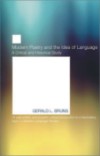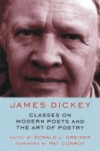|
Books
In
the World of Poetry
Sanyat
Sattar
Sometimes
it seems like there are as many definitions of poetry as there
are poems. Coleridge defined poetry as "the best words
in the best order." St. Augustine called it "the
Devil's wine." For Shelley, poetry was "the record
of the best and happiest moments of the happiest and best
minds."
Modern
Poetry and the Idea of Language
 Gerald
L. Bruns Gerald
L. Bruns
Dalkey Archive Press; April 2001
ISBN: 1564782697
Here Gerald
L. Bruns does something remarkable: he makes accessible the
theoretical issues involved in the discussion of language
as discourse versus that used in art. On one side, we have
the language of Orpheus that seeks to unite poetry and man's
experience in the world; and on the other--what Bruns calls
the "hermetic tradition"--we have language used
purely for literary and artistic ends, as exemplified in the
works of Rabelais, Flaubert (his grand ambition was to write
a novel about nothing), Joyce, and Beckett. In the process
of examining these two contrasting traditions, Bruns manages
to provide an illuminating exposition of Russian Formalist
theory.
Collected
Poems of Syed Khwaja Mainul Hassan
Syed K. M. Hassan
Writers Workshop, Kolkata; June 2003
ISBN: 8181571444
K.
M. Hassan, who is teaching now at Claflin University, South
Carolina, has been actively working in the world of poetry
for a long time and has published a number of volumes before.
This time Writers Workshop, Kolkata publishes the compilation
of K. M. Hassan's poetry. The poems are taken from Hassan's
previous four volumes: Between Barbed Wires, Inner Edge, Ashes
and Sparks, Burning the Olive Branch. This compilation has
a variety in mood and gesture. The poems here send chills
down the spine hone our sensibilities to a scalpel's edge.
The poems are modern in flavour and covers love, politics,
postcolonial aspects and the poet's personal ideologies and
philosophies. At times Hassan sounds like W. B. Yeats, where
he celebrates the power of craft to give voice to human vision.
The cover of this book is done with handloom sari cloth, which
surely has added an extra sophistication to it.
Classes
on Modern Poets and the Art of Poetry
 Donald
J. Griener (Editor) Donald
J. Griener (Editor)
University of South Carolina Press; March 2004
ISBN: 1570035288
Widely
known as the winner of the 1966 National Book Award and author
of the best-selling novel Deliverance, James Dickey devoted
himself as much to the critique of the modern literary tradition
as to his participation in it. In a comprehensive introduction
to Dickey's remarks, Donald J. Greiner evaluates the relevance
of the writer's often sharply worded opinions. This volume
brings to life class sessions planned and delivered soon after
Dickey took up full-time residence at the University of South
Carolina, in the triumphant years following his rapid succession
of honours. Full of asides, witticisms, and afterthoughts,
the sessions suggest not the pontification of a scholar at
an academic conference but the confident learning of a practicing
poet who happens to enjoy being in the classroom. Clearly
setting forth his sense of literary criticism, Dickey repeatedly
emphasizes the preeminence of the poet over the critic, the
original use of language as a primary criterion for effective
poetry, and the centrality of personal reaction to poetry
as a measure of its value. Dickey's comments are valuable
for their insight into both his own thought processes and
those of the poets he reviewed, among them William Butler
Yeats, Ezra Pound, Dylan Thomas, A. E. Housman, Gerard Manley
Hopkins, Robert Frost, Walter de la Mare, and Robert Bridges.
sanyatsattar@hotmail.com
Copyright (R)
thedailystar.net 2004
|
